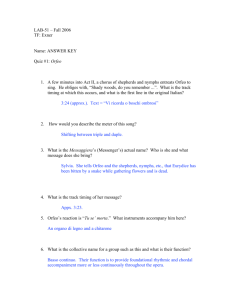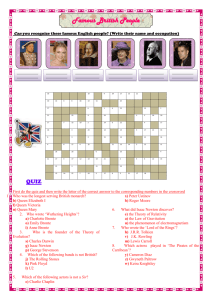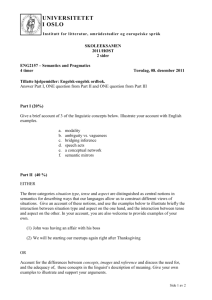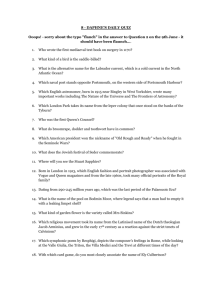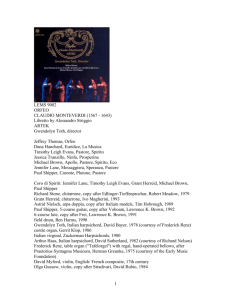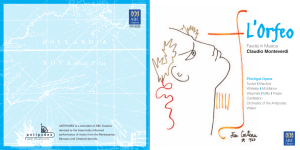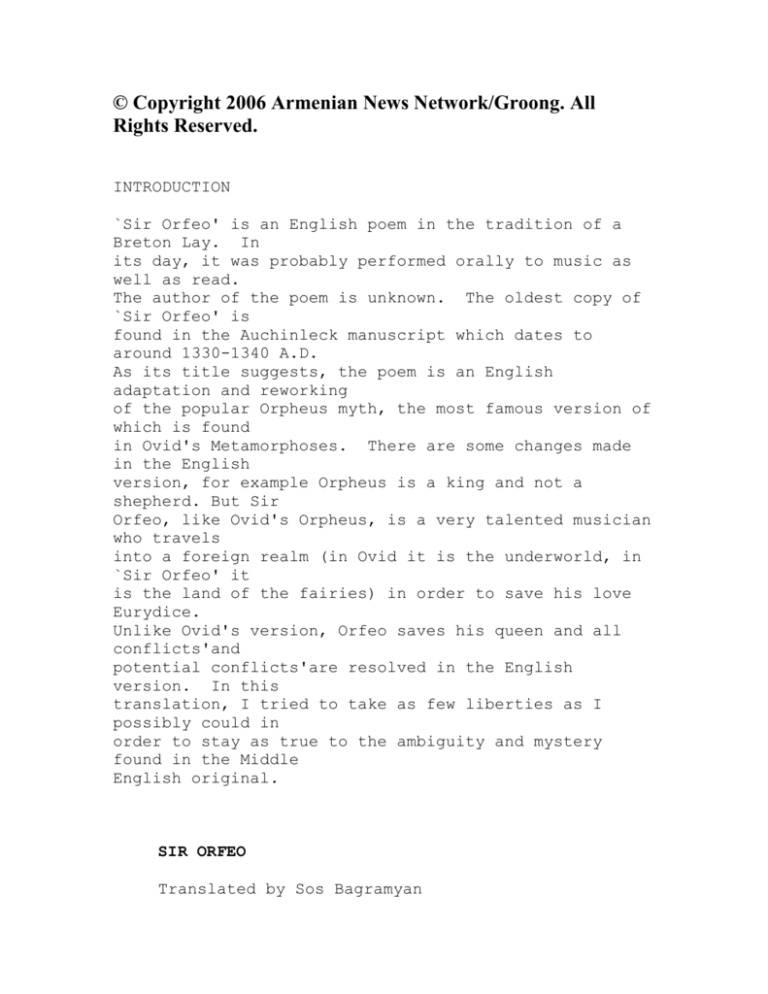
© Copyright 2006 Armenian News Network/Groong. All
Rights Reserved.
INTRODUCTION
`Sir Orfeo' is an English poem in the tradition of a
Breton Lay. In
its day, it was probably performed orally to music as
well as read.
The author of the poem is unknown. The oldest copy of
`Sir Orfeo' is
found in the Auchinleck manuscript which dates to
around 1330-1340 A.D.
As its title suggests, the poem is an English
adaptation and reworking
of the popular Orpheus myth, the most famous version of
which is found
in Ovid's Metamorphoses. There are some changes made
in the English
version, for example Orpheus is a king and not a
shepherd. But Sir
Orfeo, like Ovid's Orpheus, is a very talented musician
who travels
into a foreign realm (in Ovid it is the underworld, in
`Sir Orfeo' it
is the land of the fairies) in order to save his love
Eurydice.
Unlike Ovid's version, Orfeo saves his queen and all
conflicts'and
potential conflicts'are resolved in the English
version. In this
translation, I tried to take as few liberties as I
possibly could in
order to stay as true to the ambiguity and mystery
found in the Middle
English original.
SIR ORFEO
Translated by Sos Bagramyan
We often read and find it written,
And scholars know of this well,
Verses that are set to music
The content of which are marvelous things:
Some concern war and some concern woe
Some concern joy and mirth also,
And some concern treachery and guile
Of old adventures once upon a time,
Some concern jokes and ribaldry
And many are set in the lands of fairies.
Of all things that men relate,
Most of them, in truth, concern love.
In Brittany were these songs first wrought,
Set to music and then forth brought.
They concern adventures set in the olden days
Whereof ancient Bretons made their lays.
Kings, at times, might hear a tale
Concerning marvelous things,
Then take up the harp and minstrelsy
And write a lay and give it a name.
Of these adventures that have taken place,
I can tell you some but not all.
Now listen, lords and ladies true,
I shall tell you the tale of `Sir Orfeo.'
More than anything in this world
Orfeo loved the joy of music.
Such was it that every good mistral
Paid much homage to Sir Orfeo.
Orfeo set his keen, sharp wits
Upon teaching himself to play the harp.
He taught himself so well that no one could find
A better mistral than Sir Orfeo.
There was not a man born of this world
Who sat before Sir Orfeo
And head him playing on his harp
But that he should think that he was
Reveling in the joys of Paradise;
Such was the melody of his music.
Orfeo was a king
Of England and help high honor;
He was a man both brave and strong
And also elegant and generous.
His father was a descendant of King Pluto,
And his mother of King Juno,
Who at one time were considered gods
Because of their deeds that were put to song.
This king held court in Traciens,
Which was a city with great fortifications.
Also know that without a doubt Winchester
Was once called Traciens.
This kind had an excellent queen
Who was named Dame Eurydice.
She was indeed the fairest lady
That ever graced the earth in human form.
She was full of love and goodness,
And her beauty surpassed the spoken words of any
man.
In the beginning of May it so befell
On a pleasant and hot day,
That was away from the winters showers
And every field was full of flowers
And blossoms beamed on every bough
And beautiful plants everywhere did grow,
That this very queen, Dame Eurydice,
Took two of her most excellent maidens
During the late morning hour
To enjoy the pleasantries of her orchard;
To see flowers spread across the field
And to hear the morning birds sing.
All three set themselves down
Under a beautiful impe-tree[1]
And very quickly this fair queen
Fell fast asleep upon the green.
The maidens dared not disturb her or wake her up
But let her lay there in her sleep.
So she slept till the morning passed
And the day slipped into the afternoon,
But as soon as she began to wake
She cried, oh a most loathsome cry.
She rubbed her hands and also her feet
And scratched her face till it was wet with blood,
She tore her rich robes into tiny bits
And was driven out of her wits.
The two maidens who were beside her
Dared not stay with her any longer
But rather immediately ran to the palace
And told both squires and knights
That the queen had gone raving mad
And bade them to go and retrieve the queen.
Over sixty knights, and ladies too,
Went out to retrieve the queen.
They quickly came to the orchard and the queen,
Took her by the arms, raised her up
And, at last, brought her back to her home
And fastened her safely to her bed.
But she persisted in her cries
And wished to get up and run away.
When Orfeo heard the news of his queen
He was taken with grief as never before.
With ten knights he came
To the bedchamber, right before the queen,
Beheld her state and with great sorrow said,
`Oh Dear Life, what are thee?
One that yet had been so calm
Now strangely cries cries so shrill?
Your body, that was so exquisitely white,
Is now with your own nails torn to shreds.
Alas! Your face, that was once so red,
Is now pale as if you were dead.
And also, your slim, slender fingers
Are bathed in blood and are all pale.
Alas! Your two lovely eyes
Look at me as a man looks upon his foe!
Ah, dame, I beseech thee, mercy!
Let go of this rueful crying
And tell me what is disturbing you, and how,
And also what I can do to help you now.'
Then at last she lay still
And quickly began to weep very hard
And said thusly to the king:
`Alas, my lord, Sir Orfeo!
Since the first time we've been together
We've never once been angry with each other;
I have ever since loved you as my life
And you have loved me so as well
But now we must separate.
Take care of yourself, for I must go.'
`Alas!' he said, `I am forlorn and lost!
Where will you go? And to whom?
Wherever you go, I will go with you
And wherever I go, you shall go with me.'
`No, no sir, that cannot be.
I shall tell you all why that cannot be:
This morning as I lay
And slept in our orchard
There came to me two well armed
And handsome knights.
They came in haste and bade me
To speak with their lord the king.
And I boldly answered that
I dared not do so, nor did I want to.
Then they rode off as fast as they could
And returned, just as quickly, with their king.
More than one hundred knights,
And also one hundred damsels,
All riding on snow white steeds;
And their garments too were as white as milk.
I had never yet seen
Creatures as exquisite as these before.
The king wore a crown upon his head;
It was not made of silver not of red gold
But rather of a precious stone'
And as bright as the sun it shone!
And as soon as he came to me
He took me, whether I wished it or not,
And made me ride with him
Upon a palfrey that stood by his side.
He brought me to his palace.
It was well adorned in every way
He showed me castles and towers
Rivers, forests filled with flowers
And every single one of his gorgeous steeds.
Afterwards he brought me home,
Back into our very own orchard
And then said this to me,
`Listen, lady, tomorrow you shall be
Back right here under this impe-tree
And then you shall go with us
And live with us evermore.
If you hinder this command
Know that I'll find you wherever you go,
And I shall tear you limb from limb
And no one will be able to help you.
Although you will be this dismembered
You will nonetheless be carried back with us.'
When king Orfeo heard this news,
`O woe!' he cried, `Alas, alas!
I would rather give up my own life
Than to lose my queen, my wife!'
He asked for counsel from each of his men
But no one could offer him any advice.
When high noon came the next day
Orfeo had ridden out with his army
Numbering ten hundred knights,
Each well armed, stout, strong and grim;
And so he rode with his queen
Right to the impe-tree.
He placed a row of men on each side of the tree
And each man said that they would
Stand their ground and die
Before they'd let anyone take the queen
And yet amid their guard the queen
Was snatched up straight away
And abducted through enchantment.
The men never knew where she had gone.
Then there was much crying, weep and woe!
The king went into his chamber
And swooned and fell upon the floor
And cried such cries, and moaned such moans
That he almost spent all his life force'
There was no remedy for his pain.
He called together his barons,
Earls and renowned lords,
And when they all arrived
He said, `dear lords, before you here
I ordain my high steward
To rule my kingdom henceforth;
In my place he shall
Keep watch over all my lands.
For now I have lost my queen,
The fairest lady who was ever born,
Never again will I be with another woman.
Into the wilderness I shall go
And live there evermore
With the wild beasts of the gray woods.
When you learn of my death
Call together a parliament
And choose for yourselves a new king.
Now, do your best with all of my affairs.'
Then there was great weeping in the hall
And great crying among all who were present
There was such weeping that both old and young
Could not utter a single word from off their
tongue.
They all kneeled down together
And begged him, if it were his will,
To stay and not go far from them.
`Enough!' he said, `It shall be so!'
He forsook his entire kingdom
Only taking with him a pilgrim's mantle.
He had neither tunic not hood,
No shirt or another other goods
But he only took with him his harp
And passed barefoot through the gates
To a place no man would with him go.
Oh woe! There was such weeping and sadness
When he who had been king with crown
Went so impoverished out of his town.
Through woods and over heaths
Into the wilderness he went.
He found nothing there to comfort him
But rather he lived in great distress.
He who once wore pied and gray fur
And lay on a bed of purple linen
Now lay upon the harsh, hard heath
With only leaves and grass to cover him.
He who had castles and towers,
Rivers, forests filled with flowers
Now, as it began to snow and freeze,
The king had to make his bed in moss.
He who had excellent knights
And ladies who kneeled before him
Now saw nothing that brought him pleasure
But rather wild snakes that struck at him.
He that had everything in plenty:
Of meat and drink and every delicacy
Now had to dig and grab all day long
Before he found his fill of roots.
In summer he lived by wild fruit trees
And common berries of little value;
In winter he found nothing
Except roots, grasses and barks of trees.
His whole body wasted away
Because of the hardships he had endured.
Lord! Who may tell of the sorrow
That this king bore ten years and more?
The hair of his beard, both black and rough,
Grew down to his waist.
His harp, which was his only pleasure,
He had hid in a hollow tree,
And when the weather was clear and bright
He took up his harp
And played till his heart was content.
The sound echoed throughout the woods
And all the wild beasts that heard it
For joy willingly gathered around him,
And every bird that was in the forest
Came and perched on each nearby brier
To hear his delightful harping'
There was so much melody therein!
And when he ceased playing his harp
All of the beasts left his side.
Often in the hot evenings
He might sometimes see nearby
The king of the fairies and his company
Come out to hunt in the forest
With loud and boisterous hunting horns
And many barking hunting hounds,
But they never took home any game
And Orfeo never knew where they went.
At other times he might sometimes see
A great army come marching by,
Well equipped with ten hundred knights
Each one of them well armed
With a fierce and stout countenance
Displaying many unfurled banners
And each holding his drawn sword in hand'
And he never knew which way they went.
At other times he saw other things:
Knights and ladies who came out dancing
In elegant dress and skillful grace
They danced about with seemly steps
Accompanied by drums and trumpets
And all other manners of minstrelsy.
And one day he happened to see
Sixty ladies riding their steeds
As gentle and lively as birds on a bough;
Not a single man was in their company.
Each bore a falcon on her hand
And rode hawking by the river.
They hunted plentiful game:
Mallards, herons and cormorants.
The birds of the water rose
And the falcons marked them well'
Each falcon slew it's pray.
When Orfeo saw this he laughed:
`By my faith!' He said, `There is a sight.
By God's name, I think I'll go over there.
I have been lacking good sport.'
He arose and went over to the ladies.
As he approached one of the ladies
He beheld her face and was overcome
And say, that of all the things on earth,
It was his queen, Dame Eurydice.
He beheld her as eagerly as she did him
But neither to the other found words to speak.
Because she saw him in such a sad state,
He who had once been so rich and so high,
Tears began to flow from her eyes.
The other ladies saw this
And rode away'
She was lo longer by his side.
`Alas!' he said, `Now I am in woe!
Why will death not slay me now?
Alas, wretch, that I will not
Die after seeing this sight!
Alas! My life lasts too long
When I am no longer with my wife.
She did not even speak to me.
Alas! Will my heart not break?
By my faith' he said, `let come what may,
Wherever these ladies ride
I shall ride there too,
I do not care whether I live or die.'
He quickly put on his pilgrim's shirt
And hung his harp upon his back
And felt a strong desire to move forward'
He stumbled over neither stump nor stone.
The ladies rode into a rock
And he rode in right after them.
When he had gone into the rock
And rode about three miles or so,
He came into a fair country
As bright as the sun on a summer's day.
Smooth and flat and all green'
He could not see on hill or dale.
Amid the land he saw a castle
Rich and royal and wondrously high.
All of the outermost wall
Was clear and shone as if it were crystal.
There were a hundred towers all about
Beautiful and with stout battlements.
The buttress came out of the moat
And was made of rich, red gold.
The vaulting was all adorned
With every kind of enamel.
Within the structure were spacious rooms,
All made of precious stones;
The worst pillar you would behold
Was composed of bright, burnished gold.
The whole country was ever in light,
For when it would be dark and night
The rich stones' light began to shine
As bright as the sun at noon.
No man may tell, nor can imagine,
The exquisite work this land had wrought.
By all accounts he though this was
The proud court of paradise.
In this castle the ladies dismounted
And he wished to follow, if he could.
Orfeo knocked at the gate,
The porter was standing ready at his post
And asked what he would have him do.
`By my faith,' he said, `I am a minstrel.
I wish to regale your lord with my songs
If my words accord with his sweet will.'
The porter soon unlocked the gate
And let him enter the castle.
Then he began to look about him
And saw that the walls were lined
With people who were to brought to this place
And seemed dead, but in truth were not.
Some stood with no head,
And some had no arms,
And some had impaling wounds,
And some lay mad and bound,
And some were armed and sat on horses,
And some were choking as they ate,
And some were drowned in water,
And some were shriveled due to burning fire.
Women lay in children's beds,
Some were dead, some had gone mad,
And a great many fell and lay there
Just as if they were asleep in the evening.
Each was thus taken from their world
And through enchantment were brought there.
There he saw his own wife,
Dame Eurydice, his dear life,
Asleep under an impe-tree'
By her clothes he knew it was she.
And when he had beheld all of these marvels
He made his way into the king's hall.
Then he saw an amazing sight,
A tabernacle blissful and bright,
Therein sat the king
And his queen, fair and sweet.
Their crowns, their clothes all shined so bright
That he could scarcely behold them in his sight.
After he beheld all these things
He kneeled down before the king.
`O lord,' he said, `If it is your will
I shall play for you my minstrelsy.'
The king answered, `What man are you
That had been able to come into my land?
Neither I nor anyone I know
Has sent word out to beckon you.
Since the beginning of my reign here
I have never sound such a foolish man
Who dared come to my court
Unless I summoned him myself.'
`Lord,' he said, `Believe me full well
I am but an impoverished minstrel
And, sir, it is our custom
To seek out the houses of many lords,
Even though we may not be welcome
We must offer our services with glee.'
He sat down before the king
To play a merry sound on his harp
And struck his harp (which he could do well)
And began to play such blissful notes
That every person in the palace
Gathered around to hear him play.
They all lay down at his feet
Because his melody was so sweet
And the king listened quietly and sat still
To hear Orfeo's song, and then he was in good
spirits.
He derived great pleasure from he song
So much so that it pleased the splendid queen.
When he stopped his harping
The king said onto him,
`Minstrel, I am very pleased with your songs.
Now ask of me anything you wish
And I will generously pay my debt.
Now speak, id you wish to test my will.'
`Sir,' he said, `I beseech you,
Please give me
That same lady with the bright complexion
Who slept under the impe-tree.'
`No!' cried the king, `That can never be!
You two would make a sorry couple
For you are lean, rough and dark,
And she is beautiful, without fault.
Therefore it would be a loathsome thing
If I sent her into your company.'
`O sir,' he said, `Gentle king,
It would be a far more loathsome thing
To hear a lie escape your mouth!
So, sir, as you said just now
That I would have whatever I wanted
And you must stay true to your word.'
The king replied, `Since it is so,
Take her by the hand and go;
I hope you will be happy with her.'
He quickly knelt down and thanked the king
And took his wife by the hand
And quickly rode out of that land.
He went right out
The way he came in.
He rode the long path he had taken
And came back to Winchester,
Which was his own city,
But no man knew that is was he.
He went no further
Than the town's end,
For he did not wish to be recognized,
And took up lodging
For him and his wife
Inside a beggar's tiny house
Just like a poor minstrel would
And asked for passage into the land
And asked who the ruler was.
The poor beggar of the cottage
Told him everything he knew:
How their queen was stolen away
Ten years ago by the fairies,
And how their king had gone into exile
But no one knew to which country.
And how the steward was now in charge;
These were among the things he told.
The next morning, around noon,
He made his wife stay with the beggar.
He also borrowed the beggar's clothes,
Hung his harp upon his back
And went into the city
So that the men would see him.
Earls as well as barons bold,
Burgesses and ladies did him behold.
`Look there,' they said, `Who is that man?
How long is the hair that hangs upon him!
Look! How his beard hangs to his knee!
He is all gnarled like a tree!'
And, as he walked along the street,
With his steward he happed to meet,
And Orfeo began to loudly cry at him:
`Sir steward!' he said, `Mercy!
I am a harper from heathendom;
Help me now in this distress!'
The steward said, `Come with me, come;
Of that which I have, you shall have some.
Every good harper is welcome to me
For love of my lord, Sir Orfeo.'
In the castle, the steward sat at a table
And many lords sat by his side;
There were trumpets and drummers
Many harpers and string players'
They all made melodious music together.
Orfeo sat still in the hall
And listened. When they all sat still
He took his harp and played it loudly;
The most blissful notes he harped there,
Better than any man had heard with ear'
Every man well liked his minstrelsy.
The steward beheld and began to see
And knew at once whose harp that was.
`Minstrel!' he said, `If you wish to live
Say where you got that harp, and how!
I pray, you must answer right now.'
`Lord,' he said, `In an unknown land
As I went through the wilderness
There I found in a dale
Visages of a man torn by lions
And wolves, that ate him with teeth so sharp.
By him I found this very harp;
This was about ten years ago.'
`O!' cried the steward, `I am in woe!
That was my lord, Sir Orfeo!
Alas, wretch, what shall I do
Now that I've lost such a lord?
O, woe the day that I was born!
He was handed a bitter fate
And vile Death had him marked.'
He fainted and fell down to the ground
And at that moment his barons took him up
And told him how the world work'
`There is no solvent for a man's death.'
King Orfeo knew well by then
That his steward was a loyal man
And loved him as he aught to
And stood up and said, `Look here,
Steward, hear now this thing:
If I were Orfeo the king
And had suffered so long ago
Such sorrows in the woods
And had won my queen out of
The land of the fairies
And had brought the gracious lady
Right here to the town's end
And had placed her with a beggar
And came here myself
In impoverished dress
In order to test your good will
And learned that you were true,
You would have no reason to rue.
Surely, for love or fear,
You shall be king after I die
And if you had regaled at my death
You would have been banished without delay.
Then all those who sat therein
Recognized it was King Orfeo,
And the steward knew him well too'
Over one another the tables he threw
And fell down at his feet;
As did every other lord who sat there,
And all said in one cry:
`You are our lord, sir, and out king!'
They were happy that he was alive;
They took him to his chamber straight away
And bathed him and shaved his beard,
And clothed him as a king should be;
And afterwards, with a great procession,
They brought the queen into town
With all manner befitting her grace'
Lord! There was a great music in the air!
Tears of joy came from their eyes
To see their king and queen return safely.
Now, King Orfeo is newly crowned,
With his queen, Dame Eurydice,
And lived long after that,
And the steward was king afterwards.
After that harpers in Brittany
Heard how this marvelous tale
And made a lay of great delight
And named it after the king.
That lay is called `Orfeo';
And it is a good song, sweet in its notes.
Thus was Orfeo delivered from his cares:
May God grant us all so well to fare! Amen!
Explicit
[1] Possibly a grafted tree
-The translator, Sos Bagramyan was born in Masis,
Armenia and
immigrated to the United States in 1988. He is a
recent graduate of
UCLA holding a double major in English and Comparative
literature as
well as a minor in Armenian Studies. His interests lie
in all types
of literature, but he is particularly interested in the
drama and
poetry of the English Renaissance. The thing that
spurred him to
translate this work of Middle English were the complex,
and at times
revolutionary, ideas he discovered in the poem.

